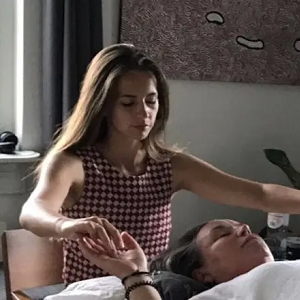Jessica on her work with PDD-NOS and High Sensitivity
Received life story from Jessica
Jessica sees Auras and has body outtakes
Dear Jochem,
W at a good initiative this site.
at a good initiative this site.
Let me introduce myself. I am Jessica (adopted=attachment problem= then again gives symptoms very similar to autism pdd nos) I work in elderly home care.
Since a month, the policy has changed as the team is self-managing. The location manager is now a coach and is not allowed to intervene... All my colleagues were struggling with 1 client except me. I was ahead of his mood because I saw/sense that this guy was building up. So with me, he almost never shouted. Explaining to my colleagues how I work was not understood. And not believed by some either. I got an improvement plan on my trousers. So my colleagues want me out. This has been playing for 6 weeks now.
In the past, I could receive images from my housemates but now that I am very pressured, I also see auras sometimes and had the other day when I was sitting on my bed that t looked like I was being lifted up and looked from above on an old Indian woman with grey hair, who was more dead than alive. (I wasn't asleep!) That fortunately only lasted for a moment. (Looked suspiciously like an out-of-body experience)
As a pdd-nosser, I used to always try to sense everyone without knowing it so that I could assess them correctly and thus stay out of the wind. No one sees me, no one gets me, no one ever puts me out. So I was subconsciously a master at sensing others. But these days, that means it's done consciously. Seeing auras and stepping out of my body I find very annoying. Not letting the other person (the client) enter emotionally is something I'm great at. This makes me not afraid and safe for the other person. And that is not believed not understood and distrusted within my profession.
The other day a colleague asked me, but aren't you intimidated when a client is fierce. I see that as them trying to get under my skin. e.g. (I'm brown...) I'm showering a little lady and she says: "If I see a black one, I'll knock it out" Let's see if she can lure me out of my tent. This lady is a bit at the bottom of the social ladder... a bit simple but a cute little lady. My reaction. I immediately saw an image before me, this lady poodle naked with a shower brush in her hands, at a stretched trot busy whacking a big nigger out of her house! So I burst out laughing and said.... "So, that sounds fierce...." Are you really going to do that? (so yeah...) boy hey..... But uh not for one thing or another, I'm not green I'm not red I'm not blue..... and now,? Are you going to beat me out of the house now too? No I was sweet. .... So what I mean to say I'm not afraid because I feel and deal with it lightheartedly don't let t come in..... one doesn't believe me and go In that improvement plan change my basic attitude.... (and also my autistic disposition, not always understanding things immediately etc )And after such an improvement plan, that should be over..... No chance, but refusing an improvement plan is the end of the story.
So I'm busy applying for a job, an interview on Monday. Now another 3 days off... But I need to see about calming down... I already walk the dog a lot, preferably slowly and quietly...... Grounding yourself well also seems to help. But I'm not very good at that.... Keeping looking ahead job applications etc so I can get out of this shark puddle calms down too.... But I so need to calm down....
Leave your reaction to this life story below.
Dear ADDs, ADHDs and HSPs,
I am Jochem and have been diagnosed with ADD and am a high-sensitive (HSP). Over the past few years, I have done an enormous amount in the field of self-awareness exercises and self-healing. Partly because in 2011 I suddenly found myself dealing with CFS/ME, or chronic fatigue syndrome, overnight. This was really a big turning point in my life which meant I really had to start working on myself from now on.
To recover, I did have to learn a lot about myself. So I pretty much went to every therapist, coach but also alternative healer you can think of.
During my search for the right help, I gained a lot of valuable knowledge that gave me very good insights and caused me to heal more and more. Now I actually see my ADD more as a strength and can live with it much better.
A book that really opened my eyes is "The Davinci Method" by John Loporto. He approaches all our traits in such a beautiful way. This is really a eye-opener For all people diagnosed with ADD or ADHD. This book was one of the biggest inspirations for me to start this website in late 2011. You can find more about John Loporto's inspiring book here. You can also see his inspiring video there in which he shares his message as an introduction to his book.
I hope this website will inspire you to look at the beautiful and powerful sides of ADD and ADHD, but of course also high sensitivity. Through all the information and tips and advice I give you the tools to be stronger with ADD, ADHD and HSP.
When you feel that spirit in yourself and are confident, you can be a person who can be very inspiring to 'normal' people. A person with a close connection to life, a rich emotional life, full of creativity, a broad thinking mind, a social being, reliable, humorous and with a very good intuition. The roles of feeling different will then reverse. But if you keep getting stuck and often think negatively about yourself, you will become more and more negatively laden and tired and the above beautiful qualities will mostly remain in the background.
On my website, I share with you all the knowledge I have. The knowledge that can give you as an ADD, ADHD and HSP person a positive spin on your life. In doing so, I share all the information I have learned from coaches and therapists and from books, documentaries and interviews.
You can read more about me on the about me page.
Happy reading ADDcharacteristics.net
Greetings, Jochem.








So what a recognition! A colleague already felt something she couldn't place with me. Maybe she is HSP too? When I mentioned that I have had the PDD NOS diagnosis since I was 6 (now 25), she understood....
However, I don't think it's PDD NOS... I'm sure I'll have autism features (that's now with HSP) but not PDD NOS. Just some examples:
- I am straightforward , says what she thinks. Also says what bothers her even though she thinks it's super
tricky
- Saying no I have super much trouble with . If my mother or colleague asks "Do you want to do this or that?" it's almost always a yes. Even if I'm low on energy, even if I don't actually have time
- When I enter a room I sense the atmosphere unerringly. The feeling that I get stuffy from the energy in the room e.g. after two people have just had a fight.
- I can take criticism very well but I take it personally and mull it over for a long time because of guilt towards the other person
- Emotions of others come crashing in. I hate arguments and disagreements. Often take them personally
- When I experience too much work pressure, I start making mistakes. I can no longer keep my head in the game. Planning sometimes goes completely haywire
- I clam up and am a yes-and-answer person when everything gets too much for me and I have no energy to defend myself. If I dare to defend myself, others think I come across as blunt (which is probably when all the emotion comes out at once).
- I consider others more important than myself , loved ones, colleagues and clients alike
- I always want to do everything perfectly (and that doesn't work in healthcare)
- Shifting gears is a thing, some colleagues notice it when I get stressed. Switching gears a few times is no problem, but the whole shift is more difficult.
- I love my work but I also live for it. There are jokes and laughter but also serious conversations. Those conversations then stick with me for days, weeks , months....
- I often worry about the client or colleague for (too) long.
- I want to be 100% sure I have done everything and often check in my head that I have (even after working hours )
- I can lie very well when necessary , a person with PDD NOS cannot do that at all, not even a little white lie
- It irritates me when a client (with classical autism) reacts in a certain way and the colleague says of ? "You should understand that since you also have autism."? However sweetly meant, it hurts. I can then go all defensive but what good does that do?
- I am very sociable, even a real chatterbox (to the irritation of some ???).
- I can sense when a client is not comfortable in their own skin
I am already looking for someone who can officially diagnose HSP. I did take a test with a psychologist once and it came out very clearly but I'm afraid I'll never get rid of that label PDD NOS again....
Also, I was wondering if anyone might have any tips on what things to improve.
My mother does not believe in the HSP diagnosis but HSP combined with PDD NOS does not exist, according to my psychologist. ?Just throw your PDD NOS diagnosis in the bin, she said ??? Girlfriends with HSP I recognise tremendously in myself with?
Dear Jessica,
What a poignant story. I think you are golden. May be in counselling, because you actually see people as they are and are not afraid of them. I recognise your story well, but think that in our society, labels are all too quickly put on as soon as someone's behaviour from the outside is not what is considered socially desirable. This happens much more often than it used to (I was born in the 1960s myself). Whereas what is needed more than ever is an eye for the person behind the patient, what that person is experiencing, what that person has been through. If that has been too intense, it is logical that there are strong reactions. Treating those same patients even more violently, so that they remain calm in behaviour only for form's sake, poses a great risk. Just like a volcano, if no space is given to let off steam, at some point the whole thing will explode, out of its skin. I can imagine that experts by experience, like you, are very good at sensing what someone who has suffered the necessary damage in his or her life needs. It is important, however, that in addition to understanding the person in question, you should at some point focus on behaviour. Because understanding without behavioural change, help goes from the shore into the ditch ... boys, in particular, get into trouble because of this. They need physical-emotional support instead of verbal-emotional support. So just go out and romp and be physical and during these kinds of activities, reflect on what is going on inside them, what they radiate, how they feel inside. In our very verbal culture, that has kind of taken a back seat... with all the consequences that entails!
You are quite right to move away from a workplace where you are not heard. After all, that's fighting a losing battle, and you won't progress there. I wish you strength, success and happiness in finding new work. Keep following your own inner compass and what feels right for you! You know and see a lot, don't let other people's ways distract you, your way is yours ;-)